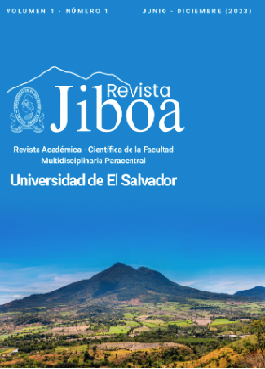Some effects of implementing the blended education modality in the FMP-UES for the COVID-19 pandemic
DOI:
https://doi.org/10.5281/zenodo.10045692Keywords:
Blended learning, digital divide, impact on learn, impact on learning, access to technologyAbstract
study was carried out in the 1-2022 academic cycle to determine, according to the students, the effects of the blended modality on the academic activities carried out at the Paracentral Multidisciplinary Faculty of the University of El Salvador. It was from this cycle that in-person activities began to be included, because from the beginning of the pandemic until cycle 2-2021 the activities were completely online. The study was conducted using a quantitative approach and is planned in different phases including planning, execution, and data analysis. 500 students from the 12 undergraduate courses offered by the FMP-UES participated by completing the survey. This number corresponds to the probabilistic sample according to the total number enrolled in that cycle. As part of the results, it is evident that there are a series of limitations in access to professional training at the faculty, the main problem being connectivity since 66.2% expressed losing the internet signal when it rains or worse, more than one third of students have coverage difficulties that prevent them from fully attending classes. The device that the majority of students used to connect to classes was the cell phone (93.8%) and taking into account the size of the screens of these devices, the correct visualization of the contents is not always guaranteed. Despite some not so favorable situations, the opinion about the learning obtained under the blended modality is positive (76%).
References
Acuña, J. G. (2008). Estudiantes universitarios: Entre la brecha digital y el aprendizaje. Apertura, 8(8), 21-33.
Arango, M. I. D. (2017). Determinar factores de riesgo psicosocial en docentes de bachillerato colegio Santa Ana.
Arango, M. I. D. (2017). Determinar factores de riesgo psicosocial en docentes de bachillerato colegio Santa Ana.
Cabezas-Heredia, E., Herrera-Chávez, R., Ricaurte-Ortiz, P., & Novillo Yahuarshungo, C. (2021). Depresión, Ansiedad, estrés en estudiantes y docentes: Análisis a partir del Covid 19. Revista Venezolana de Gerencia, 26(94), 603-622.
Campos, L. E. (2021). La efectividad del aula invertida en línea como estrategia didáctica a distancia para la educación superior, durante la cuarentena por COVID19: Un estudio de caso. Revista panamericana de comunicación, 3(1), 102-115.
Casero Béjar, M. de la, & Sánchez Vera, M. del M. (2022). Cambio de modalidad presencial a virtual durante el confinamiento por Covid-19: Percepciones del alumnado universitario: Change from Face-to-Face to Virtual Mode during Confinement due to Covid-19: Perceptions of University Students. RIED: Revista Iberoamericana de Educación a Distancia, 25(1), 243-260. https://doi.org/10.5944/ried.25.1.30623
Bernal-Meneses, L., Gabelas-Barroso, J. A., & Marta-Lazo, C. (2019). Relation, information and communication technologies (RICTs) as a tool for social integration. Interface - Comunicação, Saúde, Educação, 23, e180149.
De Castro De Castro, A. E., Borjas, M., Ricardo, C., Herrera, M., & Vergara, E. (2022). Recursos educativos digitales para la educación infantil(REDEI). Zona Próxima, 20, 1-21. https://doi.org/10.14482/zp.20.5888
Decuypere, M., Grimaldi, E., & Landri, P. (2021). Introduction: Critical studies of digital education platforms. Critical Studies in Education, 62(1), 1-16. https://doi.org/10.1080/17508487.2020.1866050
Hoffman, D., & Novak, T. (2001). The Evolution of the Digital Divide: Examining the Relationship of Race to Internet Access and Usage Over Time.
Ortiz, E. I., Herrera, E., & Torre, A. D. L. (2020). Coronavirus (COVID 19) Infection in Pregnancy. Colombia Médica, 51(2). https://www.redalyc.org/journal/283/28364445003/
Palma, M. G. (2019). Educación y exclusión digital: Los falsos nativos digitales. Revista de Estudios Socioeducativos. ReSed, 7, Article 7.
Pinto-Santos, A. R., George-Reyes, C. E., & Cortés-Peña, O. F. (2022). Brecha digital en la formación inicial docente: Desafíos en los ambientes de aprendizaje durante la pandemia COVID-19 en La Guajira (Colombia): Digital gap in initial teacher training: challenges in learning environments during the COVID-19 pandemic in La Guajira (Colombia). Formación Universitaria, 15(5), 49-60. https://doi.org/10.4067/S0718-5006202200050004
Downloads
Published
Issue
Section
License
Copyright (c) 2023 https://creativecommons.org/licenses/by/4.0/

This work is licensed under a Creative Commons Attribution-NonCommercial-ShareAlike 4.0 International License.








